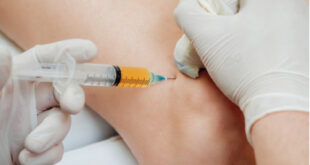 “With age comes wisdom” is a well-known saying reflecting the common belief that we gain valuable knowledge and insight as we get older. However, as we add more candles to our birthday cakes, we also increase our risk of
“With age comes wisdom” is a well-known saying reflecting the common belief that we gain valuable knowledge and insight as we get older. However, as we add more candles to our birthday cakes, we also increase our risk of
developing cancer.
While cancer can occur at any age, the likelihood of developing the disease rises as we get further into adulthood. According to the National Cancer Institute, the rate of cancer diagnosis for Americans ages 45 to 49 is 350 cases per 100,000. That rate nearly triples for adults ages 60 and older to 1,000 cases of cancer per 100,000 people.
While scientists continue to research for a clearer understanding as to why this occurs, several factors are known to contribute to this phenomenon:
• Cellular damage: Over time, cells accumulate damage to their DNA. While the body has mechanisms to repair this damage, their efficiency can decrease with age, leading to an increased likelihood of mutations that can cause cancer.
• Weakened immune system: As we age, our immune system’s ability to detect and destroy cancerous cells diminishes, making it easier for cancer to develop and spread.
• Exposure to carcinogens: The longer a person lives, the more they are exposed to potential carcinogens, such as tobacco smoke, ultraviolet (UV) radiation and certain chemicals. These exposures can accumulate and contribute to cancer risk.
• Chronic inflammation: Over time, infections or autoimmune diseases, environmental factors and even our diets can damage tissues and promote cancer growth.
• Hormonal changes: Changes in hormone levels can influence the risk of developing certain types of cancer, such as breast and prostate cancer.
National Healthy Aging Month is observed every September in the United States. It was established to focus national attention on the positive aspects of growing older. The goal is to inspire adults, particularly those over 45, to take charge of their health, maintain active lifestyles and pursue activities that promote physical, mental and emotional well-being.
Although we can’t stop the physical aging process, here are some key strategies for reducing cancer risk:
• Regular physical activity can be a powerful tool. However you choose to keep moving, you’ll help boost the immune system and enhance its ability to detect and destroy cancer cells, regulate hormones such as insulin and estrogen, reduce inflammation, aid digestion and maintain a healthy weight. Obesity is a significant risk factor for various cancer types.
• Maintain good mental health and seek help if you experience prolonged periods of stress, anxiety or depression. Exercise can also help reduce stress and support healthy lifestyle choices.
• Smoking and vaping are linked to various types of cancer, including lung, throat, mouth and bladder cancer. Avoid tobacco and exposure to harmful chemicals.
• Protect your skin. Wear sunscreen even on cloudy days. Wear protective clothing, find shade when in the sun and avoid tanning beds to avoid skin cancer, the number one cancer among men and women (and the most preventable cancer type).
• Eat a diet rich in fruits, vegetables, whole grains and lean proteins. Limit processed foods, red meats and foods high in fat and sugar. Also, limit your intake of processed meats like hot dogs and deli meats, which are linked to an increased risk of certain cancers.
• Participate in recommended health screenings. Certain cancer types are much easier to treat when detected early, preventing thousands of cancer cases and deaths. Thanks to ongoing research, screening tests are now available for many types of cancer. These tests are effective at finding cancer, often before signs or symptoms appear. Early diagnosis and treatment are a substantial factor in surviving the disease.
• Have regular medical checkups with your health care provider to monitor your overall health and discuss any concerns or changes. Review your family history of cancer to understand your risk and explore preventive measures that may be appropriate.
Implementing these practices at any age can significantly reduce cancer risk and contribute to overall health and well-being. That can help make blowing out those birthday candles even more enjoyable!
WORLD-CLASS CANCER TREATMENT, CLOSE TO HOME
About Florida Cancer Specialists & Research Institute, LLC:
(FLCancer.com)
For the past 40 years, FCS has built a national reputation for excellence that is reflected in exceptional and compassionate patient care, driven by innovative clinical research, cutting-edge technologies and advanced treatments, including targeted therapy, genomic-
based treatment and immunotherapy. Our highest values are embodied by our outstanding team of highly trained and dedicated physicians,
clinicians and staff.
In Palm Beach County, board-certified physicians specializing in hematology, medical oncology and radiation oncology provide personalized care for all forms of cancer and blood disorders. With extraordinary skill and experience, they deliver treatments with maximum effectiveness and safety, combined with compassion and concern for patients and their families. From genetic screening to immunotherapies and access to the latest clinical trials, our top-ranked cancer experts provide the newest and most advanced treatments available – increasing cure rates and extending lives
Florida Cancer Specialists & Research Institute
Boca Raton
21020 State Road 7, Ste 200C
Boca Raton, FL 33428-1320
FLCancer.com/BocaRaton
Delray Beach
5130 West Linton Blvd, Ste B4
Delray Beach, FL 33484-6595
FLCancer.com/DelrayBeach
Lake Worth
4801 S Congress Ave, Ste 400
Palm Springs, FL 33461-4746
FLCancer.com/LakeWorth
Palm Beach Gardens
3401 PGA Blvd, Ste 200
Palm Beach Gardens, FL 33410-2824
FLCancer.com/PalmBeachGardens
Wellington North
1037 S State Road 7, Ste 303
Wellington, FL 33414-6140
West Palm Beach, FL 33401-3406
FLCancer.com/WellingtonNorth
West Palm Beach
1309 N Flagler Dr
West Palm Beach, FL 33401-3406
FLCancer.com/WestPalmBeach
For more information, visit FLCancer.com.
 South Florida Health and Wellness Magazine Health and Wellness Articles
South Florida Health and Wellness Magazine Health and Wellness Articles




